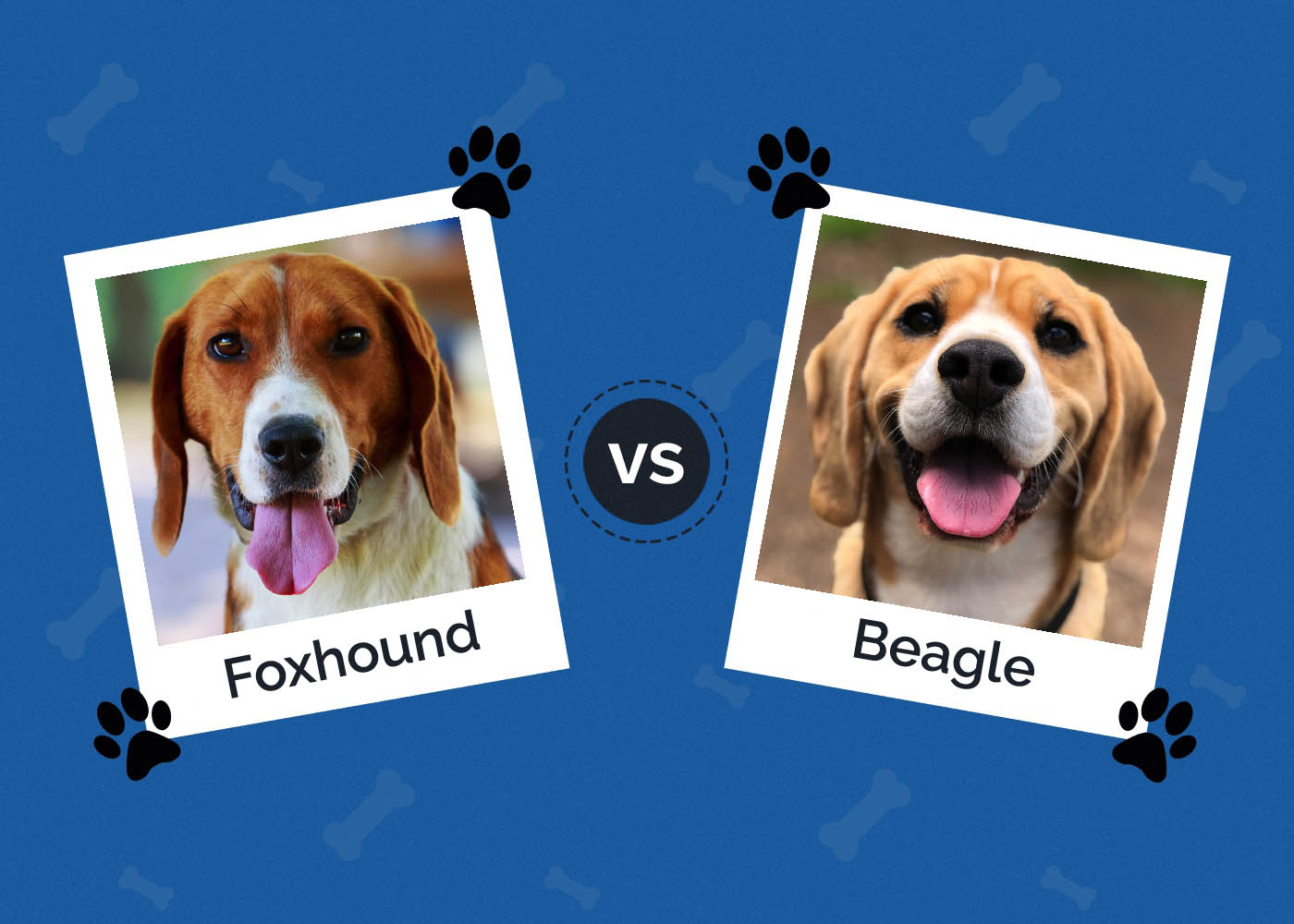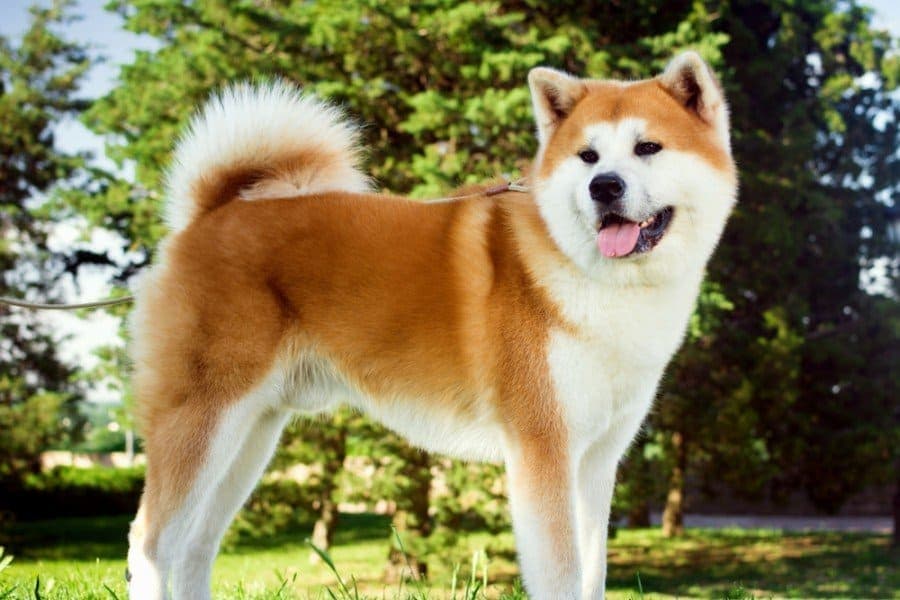Dog Sleeps With Eyes Open: Is This a Problem?

Updated on
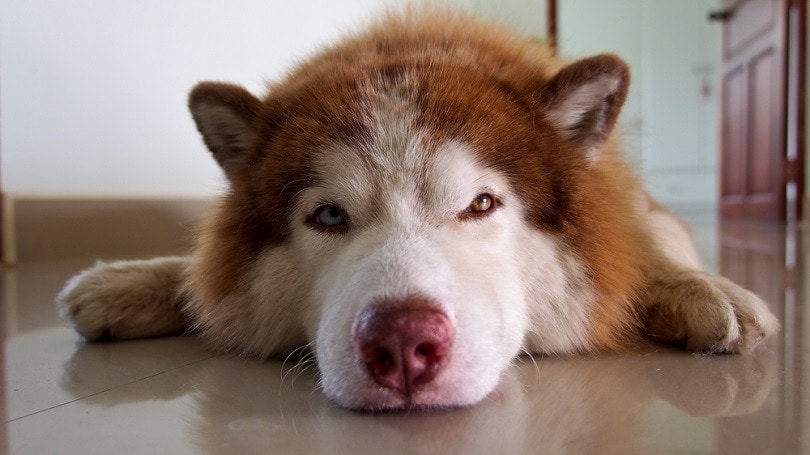
If you have ever noticed your dog’s eyes open when they are sleeping, you were probably caught off guard. After all, it is a little gross and painful looking. Before panicking and calling your vet, know that there is probably no problem since it is very common for dogs to sleep with their eyes open.
Though most dogs who sleep with their eyes open are having a healthy and restful night’s sleep, there are a few times when sleeping with their eyes open is a problem. Knowing when to distinguish between normal sleeping and abnormal sleeping is key to determining whether or not it is a problem if your dog sleeps with its eyes open.
In this article, we are going to help you determine whether or not it is a problem for your dog to sleep with its eyes open. The chances are that your dog is completely healthy, and you have nothing to worry about. On the off-chance that your dog has a more serious condition, it is important to take them to the vet ASAP.
Do Dogs Sleep With Their Eyes Open?
Even though it can be a bit startling to see your dog sleeping with its eyes open, it is pretty normal. In fact, even 20% of people sleep with their eyes at least partially open. More interesting is the fact that many animals, including dogs, have the ability to sleep with their eyes only partially closed. In this way, humans are actually the minority.
Because it is so common for dogs to sleep with their eyes open, you probably do not have anything to worry about. If your dog is behaving as it normally would, chances are it is just sleeping, albeit in a slightly unsettling manner.
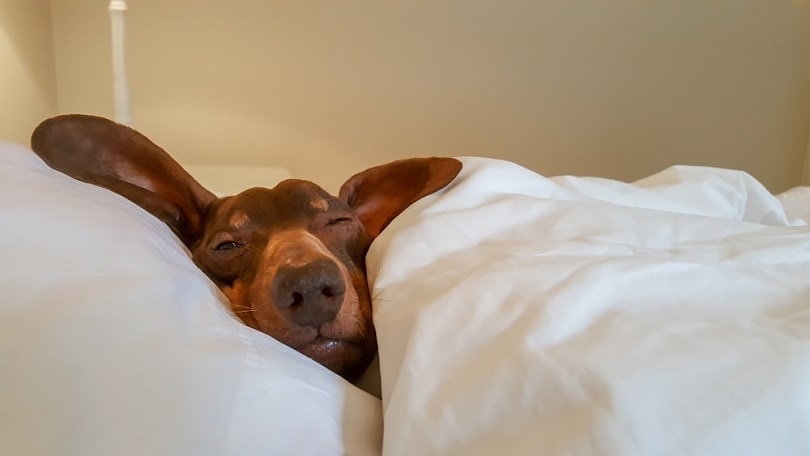
Why Does My Dog Sleep With Their Eyes Open?
Scientists do not know the exact reason why dogs sleep with their eyes open, though they have some hunches. These hunches have to do with their evolved survival strategies that have helped dogs remain apex predators throughout the years.
Many species have developed this ability as a survival skill. It helps them to be more alert while sleeping, allowing them to protect themselves against predators and danger. It even tricks some predators into thinking that the animal is awake, making the predator less likely to attack.
Does Sleeping With Open Eyes Hurt Dogs?
Humans have to close their eyes to sleep because our eyes will get dry and itchy if they remain open for too long. That is why we have to blink when we are awake and completely close our eyes when we are asleep and unable to blink. This fact may cause you to wonder if sleeping with their eyes open has the same painful effect on dogs as it does on us.
Fortunately, a dog eye’s structure is very different from that of a human eye, allowing them to keep their eyes open for longer without any dryness or itchiness. In fact, you are probably not looking at your dog’s eyeball if their eyes are only open a little bit while they sleep.
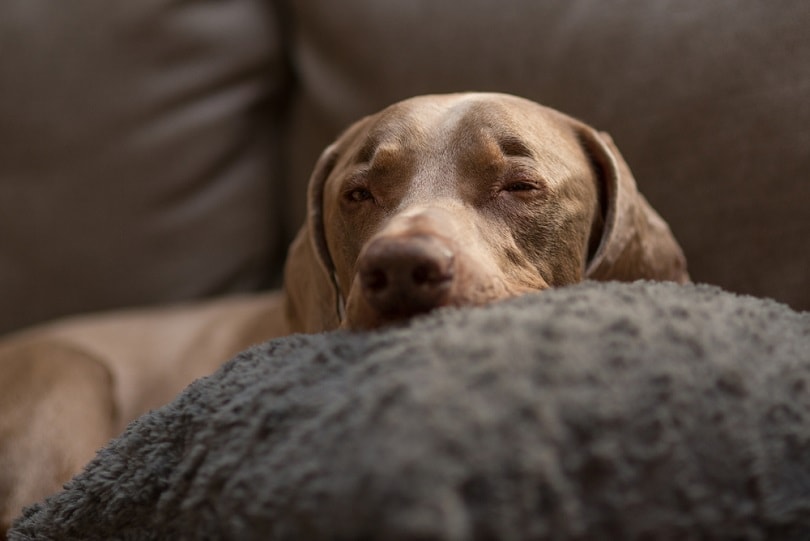
Instead, dogs have a third eyelid that is called the nictitating membrane. It sits behind the outer eyelid and is designed to clean and protect the eyeball. It actually sweeps away debris and dust every time the eye closes. Whenever your dog opens its eyes, this third eyelid retracts into the eye’s inner corner.
When your dog’s eyes are only partially open, the third eyelid remains in the closed position. As a result, you are likely looking at the nictitating membrane, not the eyeball, whenever your dog’s peepers are just slightly open during sleep. It also means that their eyes do not get dry or itchy.
- You might be interested in: 10 Best Calming Dog Beds – Reviews & Top Picks
Do All Dogs Sleep With Their Eyes Open?
Although we could not find any comprehensive studies about whether all dogs sleep with their eyes open, anecdotal experience seems to suggest otherwise. If you have had any dog, you have likely seen them sleep with their eyes completely closed at least once. This makes it completely possible for dogs to sleep with their eyes closed.
Because of this fact, it seems that all dogs can sleep with their eyes open, though not all actually do so.
When Open Eyes While Sleeping Is a Problem
Usually, a dog sleeping with its eyes open has absolutely no health conditions to fret about. However, there are certain times and instances when you should be a bit concerned about your dog’s sleeping patterns whenever their eyes remain awake.
Narcolepsy in Dogs
For example, narcoleptic dogs may sleep with their eyes open because their sleep pattern is so abnormal. If your dog collapses on the ground, lies incredibly still, and enters into a twitching sequence, almost as if they are in a dream, during inappropriate moments, your dog may be narcoleptic.
Narcolepsy is a typically inherited disorder, though not always. Doberman pinchers are the most common breed to express the hereditary form. Poodles, Dachshunds, and Labradors can have the hereditary trait as well.
During a narcoleptic episode, many dogs will continue to have their eyes partially open. In some cases, their eyes are actually sending information to the brain, even though they are sleeping.
Epilepsy in Dogs
Epilepsy is another condition that may cause your dog to appear like they are sleeping with their eyes open. However, your dog will not be sleeping at all. Epilepsy means that your dog suffers from recurring seizures, rendering them unable to respond.
Most people imagine seizures as being a grand event, complete with a lot of convulsive movements. This seizure type is known as a grand mal seizure. Though it is completely likely that a dog has a grand mal seizure, dogs can have petit mal seizures or absent seizures.
During absent seizures, your dog may drool, tremble, or lie on the floor. When they do this, their eyes look unfocused and vacant. Because these dogs are unresponsive during their epileptic fits, they will not be able to respond to you. This causes many owners to think that their dogs are asleep, even though their eyes are open.
Once again, epileptic dogs are not asleep. Instead, they are rendered unresponsive because of their epileptic seizure.
When to Call Your Vet
If your dog has absolutely no other conditions and seems to appear really well-rested and content after sleeping with its eyes open, you have nothing to worry about. You do not need to call your veterinarian because they are likely sleeping out of instinct.
There are a few signs that your dog may have an underlying condition causing them to sleep with their eyes open, such as narcolepsy or epilepsy.
- Your dog continues to sleep with its eyes open even though its eyes appear dry, itchy, inflamed, watery, or sore.
- Your dog falls asleep at unexpected moments, like when they are exercising.
- You cannot gently wake up your dog or get them to respond from a few feet away, even when their eyes are open.
If your dog demonstrates any of the previous symptoms, you need to call your veterinarian. Your dog may have a dangerous health condition that causes them to sleep with their eyes open or at least appear like they are sleeping with their eyes open.
Final Thoughts: Dog Sleeping With Eyes Open
If you are startled by your dog sleeping with its eyes open, do not worry. Dogs are fully able to sleep in this way with no pain, discomfort, or underlying health conditions. However, your dog may have an underlying health condition if their sleeping is accompanied by irregular patterns or difficulty waking them up.
For dogs that have no other symptoms, they are probably just sleeping. Let those sleeping dogs lie and enjoy their open-eyed sleep!
Related Reads:
Featured image credit: Wichatsurin, Shutterstock





